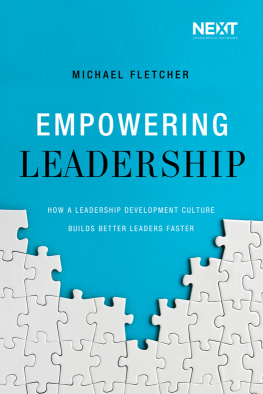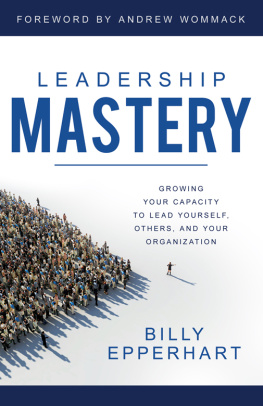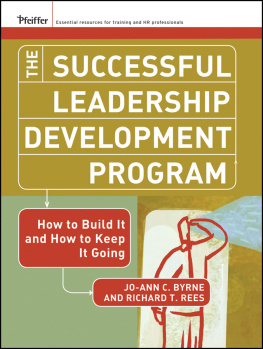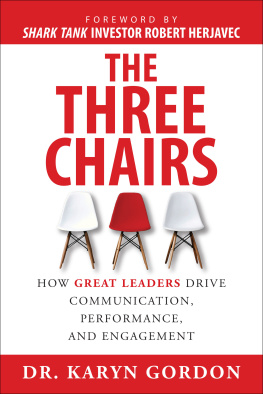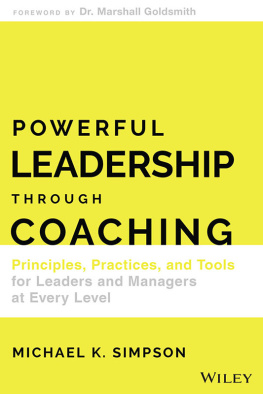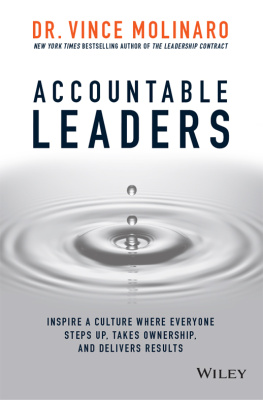The Little Book of
LEADERSHIP
DEVELOPMENT
50 Ways to Bring Out the Leader in Every Employee
SCOTT J. ALLEN
MITCHELL KUSY

Bulk discounts available. For details visit:
www.amacombooks.org/go/specialsales
Or contact special sales:
Phone: 800-250-5308
E-mail: specialsls@amanet.org
View all the AMACOM titles at: www.amacombooks.org
This publication is designed to provide accurate and authoritative information in regard to the subject matter covered. It is sold with the understanding that the publisher is not engaged in rendering legal, accounting, or other professional service. If legal advice or other expert assistance is required, the services of a competent professional person should be sought.
Library of Congress Cataloging-in-Publication Data
Allen, Scott J., 1972
The little book of leadership development : 50 ways to bring out the leader in every employee / Scott J. Allen, Mitchell Kusy.
p. cm.
Includes bibliographical references and index.
ISBN-13: 978-0-8144-1754-6
ISBN-10: 0-8144-1754-X
1. Leadership. I. Kusy, Mitchell. II. Title.
HD57.7.A425 2011
658.4092dc22
2010053493
2011 Scott J. Allen and Mitchell Kusy.
All rights reserved.
Printed in the United States of America.
This publication may not be reproduced, stored in a retrieval system, or transmitted in whole or in part, in any form or by any means, electronic, mechanical, photocopying, recording, or otherwise, without the prior written permission of AMACOM, a division of American Management Association, 1601 Broadway, New York, NY 10019.
About AMA
American Management Association ( www.amanet.org ) is a world leader in talent development, advancing the skills of individuals to drive business success. Our mission is to support the goals of individuals and organizations through a complete range of products and services, including classroom and virtual seminars, webcasts, webinars, podcasts, conferences, corporate and government solutions, business books and research. AMAs approach to improving performance combines experiential learninglearning through doingwith opportunities for ongoing professional growth at every step of ones career journey.
Printing number
10 9 8 7 6 5 4 3 2 1
To four mentors who sparked (and nurtured) my interest in the academic study of human resource development and leadershipBrenda Levya-Gardner, Sharon Korth, Richard Couto, and Jon Wergin.
Scott J. Allen
To so many who have made this book possible through their generosity, professionalism, and nurturing. Your leadership is something for which I will always be grateful.
Mitchell Kusy
Contents
Foreword
L EADERSHIP, I HAVE SAID over the years, is the ability to raise ones voice over the general chaotic buzz of an organization and later turn out to have been right. I came up with this definition partly out of frustration over all the definitions that there are of this word that attracts so much interest, and partly from a realization that we dont often think of giving or receiving leadership in the instant that it is occurring. Only later do we realize that either we or someone else had supplied leadership.
In the instant we are doing what we think needs doing. Our behavior is specific and concrete, and of course quite complex. Meanwhile, leadership is abstract and general. The words we use to talk about itwords about style and about function and about contentsimilarly tend to be abstract and general. It is very difficult to talk meaningfully about leadership in terms of the concrete attitudes and actions leaders display, and in terms of the concrete responses they receive.
Theres another problem many of us who teach and consult about leadership continually encounter. If we talk about leadership abstractly, presenting theories and frameworks for thinking about leadership, participants will often object: This is all too general. How does it apply to my situation? Whereas if we get down and dirty and try to be as specific as we can about, say, leading a meeting, the response we often get is, My situation isnt quite like this one youre describing. At this point, if we attempt to elicit the details of a particular participants situation, we can see the eyes of others beginning to glaze over, because to get really specific about one participants situation is probably to get into details of personality and of culture and of technology and of formal structure that seem far removed from the situations of other participants.
A final chronic problem with teaching and training about leadership is that theres doing it and then theres talking about it. No amount of talking about it seems to result in people becoming better at doing it. This problem has led to all kinds of attempts to introduce more experiential material into classes and training situations. It is very hard to achieve a truly convincing reality to these experiential situations. Adult training and development practices have probably done a better job than the academic environment. We professors keep interrupting experiential material to point out the presence of concepts, or to have people write in journals, or discuss what was going on in the simulation. Such interruptions may be justified for other reasons, but they do detract from the impact of the leadership situations we foster in classrooms. No doubt there are other conundrums associated with teaching and training about leadership. But these threethe split between abstract and concrete, the paradoxes of prescribing generally versus concretely, and the fact that leading and talking about leading are two different thingsare enough to make the point: that despite thousands of books and articles about leadership, and who knows how many millions of hours devoted to discussing it, to say nothing of all the actual leading that is going on constantly in the world, the nature of leadership, how to do it better, and how to teach others to do it remain maddeningly elusive. If it werent so important, we probably should have given up the attempt years ago.
And indeed important it is. As this is being publishedat the beginning of 2011it cannot be more obvious that the world is full of problems that cry out for leadership. We are fond of talking about the leadership that we need from our national and international leaders and from senior executives in organizations, but the fact is that all these individuals can do is inspire more leadership throughout the organizations and institutions that they lead. New and better things will happen because of the efforts of these more local leaders as much or more than the efforts of the men and women on the world stage.
Against this background, Scott Allen and Mitch Kusy have produced this wonderful little book of practical wisdom about leading and leadership. I welcome their decision not to produce yet another abstract framework that tries to say once and for all what leadership is. Once and for all, there is no once and for all about leadership. What exists, though, are lots of ideas about leading more effectively and what the learning process for leadership is. This is what the authors offer. Each of their tips pertains to some sort of problem or situation leaders encounter. You can quickly tell that the authors themselves have been there, done that. Each tip resolves the abstract-versus-concrete issue I mentioned earlier by just staying practical and describing things a leader or leadership educator can actually do to move the learning along.



